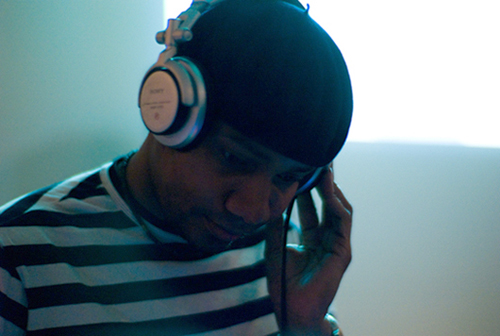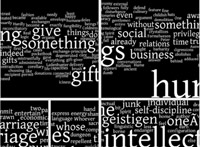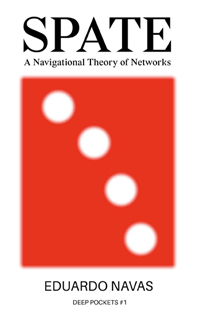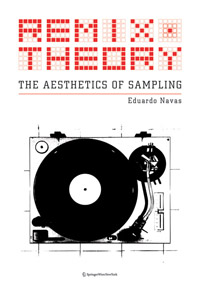Reggae, Dub and Memory Play: Paul D. Miller – interviewed by Eduardo Navas

[photo: joi ito]
This interview was originally published on Vague Terrain for their August 2008 Digital Dub Issue.
Paul D. Miller, AKA DJ Spooky is a multitasker. He is known for his music productions, as well as his art and film projects. He also has been writing about art and culture for many years. In the last few years, Miller has worked with Trojan Records to develop compilations about Reggae and Dub with a critical yet playful take on the complexities of Jamaica. Most recently, he edited Sound Unbound for MIT Press, a book which comprises a set of texts about the influence of sound in media and culture at large. In the following interview, DJ Spooky, discusses his current projects in a global context, and motivates us to move beyond basic binaries onto a more productive and creative state.
Eduardo Navas: In your most recent Recording Project “Creation Rebel” as well as “DJ Spooky Presents In Fine Style 50,000 Volts of Trojan Records!!!” you write short historical essays about the culture of Reggae, Dub and the Big Sound System. You are also very careful to present your position as a cultural insider, given that you used to visit Jamaica as a kid; and you also state that you were approached by Trojan Records, rather than the other way around, which would otherwise place you, regardless of ethnicity, in a position of “explorer” or Neo-colonial. Based on all this can you explain how you see colonial ideology at play in Jamaica today?
DJ Spooky: The situation Jamaica faces today is part of a global cycle of hyper capitalism – even the Cayman Islands used to be part of Jamaica… anyway, yeah, the whole system is based on production models that privilege the “developed” economies over the “developing” ones. From Mugabe in Zimbabwe to Thabo Mbeki in South Africa, Kim Jong Il in North Korea, or Hugo Chavez in Venezuela, and Ahmadinejad in Iran, people in “developing” economies are faced with rulers just as flawed as anything the U.S. can summon up with people like Bush or Reagan. I tend to think that everything is connected. My Trojan records project is an exploration of the archives of one of my favorite record labels during a time of intense political upheaval. But it’s also about showing how people make music out of their circumstances.
EN: You claim that if we are to look at the cut and paste aesthetics in music culture today which, according to you, currently culminates in the ipod, that ground zero is Jamaica’s sound system. Given that the term ground zero is directly linked to war, and does not imply a “pure” beginning, but rather an explosion, can you talk a bit about the politics that you think led to Jamaica’s creativity and its ability to spread to places like New York and London? I know books have been written about Jamaica, but it would be great if you could share your own experience while you were there, particularly about its apparent recent music revival.
DJS: The whole “ground zero” metaphor can be mapped onto anything – plagues, viruses, wars etc. It’s simply a metaphor for where things start. I look at the cut and paste scenario as a situation where global youth culture has faced the conflicted and paradoxical nature of the production of culture in a deeply connected world, and said – this is just the way it is.
EN: Do you consider yourself as a type of postmodern historian who retraces things that may have been missed by people in the past? If so, what is your aim in revising history–is a remixer a historian of sorts?
DJS: Nah, I’d say the role of the dj is something like a cultural historian, or archivist, but basically it’s about play with memory. My next album is called “The Invisible Hand” and it’s about the early forces of globalization that influenced how migrations occurred throughout the last couple of centuries and made the way we live today possible with music. Indians in Jamaica! Chinese people in Jamaica! Africans in India! Palestinian hip hop! Israeli hip hop! Icelandic techno! Brazilian balle funk! Angolan kuduru! That’s the kind of stuff I’m listening to now. My book “Sound Unbound” looks at this kind of hybridity in sound and in art. I guess it’s a collection of essays as “mix tape.” There’s nothing post modern about it. It’s just the way we live today.
EN: When you discuss Remix Culture, you usually focus on the positive aspects, the creative potential, and you do acknowledge intellectual property conflicts. In your opinion is there a division of commercial non-commercial these days? Does a culturally critical position about mass culture, or shall we say the culture industry hold up these days in your opinion? If so, how might it be different from previous time periods.
DJS: Who owns memory? That’s what alot of my work is about. When I look at a wall of records I don’t see the records sitting there. I see the interconnectedness of the records – how they’d sound mixed with one another. In my book “Sound Unbound” I asked the legal counsel for Google, Daphne Keller, to write an essay about this kind of thing. But I’m just as influenced by thinkers like Badiou, Ranciere, Zizek, or Cornell West. The main issue is how to synthesize so many of these disparate thoughts into music, and out of the music, to distill art.
EN: Your response alludes to frictions of intellectual property, of course. I wonder, if at one point when you look at the wall of records, you ever worry if the interconnectedness that you perceive will be disrupted by legal issues: perhaps that perfect mix that you envision will only be played out in your mind? This in a way is a well established conundrum, evaluated in depth by Creative Commons, as we know. But if we are to consider your question of who owns memory, then, could you explain how you balance out your creative process from the moment you envision your compositions and remixes to the moment when they are reshaped by the current state of intellectual property? Do you have any suggestions to improve the creative flow?
DJS: Basically the way we live and the way the law is written are parting ways. That doesn’t mean that wholesale copyright violation is “cool” – it just means that people have to update the way they try to convince people that there is value in paying for music. Legal issues – that’s an understatement! Basically, if you’re an artist, you never want to get sued. My creative process has shifted away from sampling old records into more text based stuff – like my books and my films. I went to Antarctica in December/January to shoot a film about the sound of ice. That’s the kind of material I’m sampling now.
EN: Do you see sampling as a vehicle of dissemination? if so, then how can it cross class differences effectively? This may be related to what many call the digital divide.
DJS: Sampling asks alot of questions about inter-connectivity. It destabilizes the categories of indiviual creative agency and says, this, perhaps, is a collective, shareware scenario. I like that. To me, the digital divide is an obsolete idea. We should be talking much more about digital convergence – about how different cultures are adapting to an information based global economy.
EN: When you mention digital convergence, Henry Jenkins comes to mind. In his book “Convergence Culture” he actually acknowledges that his analysis consists of middle class beta testers or early adapters. I bring this up because it is well known that for anyone to participate in online culture, and contribute to the global economy as a producer (not just as a consumer), a certain level of education is necessary, and this is relevant to the concerns of the haves and the have nots often linked to “the digital divide”. If we are to stop thinking of the term “digital divide” as you suggest and consider how different cultures are adapting to an information based economy, how do you think such scenario is affecting the possibility to attain knowledge in local communities vs. the network?
DJS: I often DJ in countries like Russia, Brazil, or places like South African and Angola. One thing I’ve always seen is that people “re-purpose” everything. In countries like Russia, for example, people always learn how to fix things – tv’s, computers, etc etc. America has a disposable culture – no one knows how anything works. One could argue that America is actually behind alot of countries vis a vis digital literacy – actually knowing how to read code etc. I think most people in terms of digital media are functionally illiterate. Creativity is a language we all speak.
Lascia un commento
You must be logged in to post a comment.








